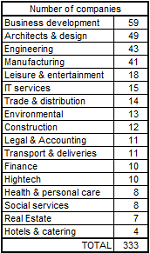|
EFES NEWSLETTER - JANUARY 2021
|
Employee
share ownership in SMEs – Great Britain's success
|
|
It
is well known that the transfer of a company represents
the most favourable moment in time and the most efficient
operation for multiplying employee share ownership in
SMEs.
This
is what convinced the USA to implement the ESOP technique
in 1974. In
Europe, the first country to act in the same direction
was Great Britain, with the launch of the Employee Ownership
Trust (EOT) formula in April 2014.
Question:
Is it a success?
-
From 19 transfers in 2014, it rose to 27 in 2015,
then 33, 43, 56, 66 and finally 86 in the first
eleven months of 2020 (Table 1). A total of 333
companies were thus transferred to more than 30,000
employee shareholders. To reach a comparable number
of employee shareholders, it had taken France more
than a hundred years, thanks to the formula of the
workers' cooperative - the SCOPs (and even more
in Italy with the cooperative di lavoro).
-
In
a very large number of cases, as with the ESOP plan,
these are 100% business transfers to employees.
In other cases, it is a question of partial transfer.
-
The
average size of the transferred companies is 91
employees, which is very representative of the size
of the average SME. In a small number of cases,
these are micro-enterprise transfers, with an average
size of 7 employees. The average size of the "small"
companies transferred is 25 employees, and the average
size of the "medium" companies is 100
employees. Finally, there are 806 employees on average
for "large" unlisted companies. All these
figures are very much in line with the average size
of the populations of companies of all sizes. The
formula therefore shows a very high degree of adaptability,
without bias in terms of the size of the companies.
-
The
sectors of activity concerned are mainly high value-added
and high-tech sectors (Table 2). Here again, the
wide range of business sectors is a sign of the
formula's great adaptability.
In
short: A remarkable success !
Thus
Great Britain is the only European country so far to
have been able to set up an effective policy of employee
share owneership in SMEs.
Yet
it could be even better.
Thus
in 1980, a few years after its launch in 1974, the ESOP
plan already had some 5,000 business transfers to its
credit in the USA. At the time, the population of Great
Britain was one third of that of the USA. On the scale
of Great Britain, the ESOP plan had therefore enabled
a little over 1,500 companies to be transferred, compared
to the 333 company transfers observed today with the
EOT formula.
|



|
|
Why
the difference in efficiency between the two formulas?
The
EOT formula is a simplified derivative of the ESOP plan.
It seems that in this case, as often, the original is
better than the copy.
Indeed,
there are two main differences between ESOP and EOT:
1.
EOT is based on a tax exemption on dividends (distributed
as bonuses to tax-exempt employees up to £3,600 per
year), under special legislation. In
comparison, the ESOP plan allows for the exemption not
only of dividends but also of the company's profits.
The ESOP formula therefore avoids both profit tax and
dividend tax. And this, not by virtue of any particular
legislation, but by virtue of the simple fiscal engineering
of employee share ownership.
2.
In the ESOP formula, employees can cash in their shares
and sell them when they leave the company (usually upon
retirement). In the EOT formula, they cannot, the trust
holds the shares for an indefinite period of time, in
perpetuity.
These
two differences probably explain the much greater success
of the ESOP plan.
Today,
however, there is a worldwide debate on the respective
advantages of the two formulas. ESOP or EOT? The question
is being asked in Great Britain as well as in the USA,
Canada and Australia.
Two
formulas are better than one! It might be appropriate
in the USA to add the EOT formula next to the existing
ESOP model. And it would no doubt be wise in Great Britain
to introduce the ESOP formula in addition to EOTs.
In
both cases, it should be easy to leave the choice of
formula to the new shareholders. Once the trust has
been set up, the choice of formula would be left to
the new shareholders, allowing it to materialise either
in the form of an ESOP or an EOT. There is no doubt
that employee shareholding would find even more legitimacy
and support.
Read
more
|
Press
review
We have a selection of 24 remarkable articles
in 7 countries in December 2020: Belgium, China, Germany,
France, Italy, UK, USA.
Belgium: The most effective employee share plans for
startups are stock options, even in Belgium.
China: Essilor and John Lewis are the two benchmarks
for employee share ownership at Huawei.
Germany: Special issue on employee share ownership
in Germany.
France: New employee share plan for EssilorLuxottica.
Most business transfers to employees in France take the form
of a workers' co-operative.
Italy: New employee share plan for Inwit.
UK: Many new business transfers to Employee Ownership
Trusts. Turn covid emergency debt into employee share ownership
urges SMEs.
USA: New York City launches new employee-owned business
transition hotline. There are a number of different ways
by which firms may adopt employee share ownership, such
as an employee stock ownership plan (ESOP), worker cooperatives
and even stock-options. Do you want to never pay taxes
ever again? - Consider an employee stock ownership plan.
The full press review is available
on:
http://www.efesonline.org/PRESS
REVIEW/2020/December.htm
|
 A
political roadmap for employee ownership in Europe
A
political roadmap for employee ownership in Europe
 The
EFES needs more members. Download the EFES membership form
The
EFES needs more members. Download the EFES membership form
 What's
new on the EFES website?
What's
new on the EFES website?
 EFES NEWS
distribution: 200.000
EFES NEWS
distribution: 200.000
|